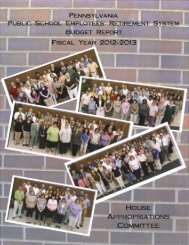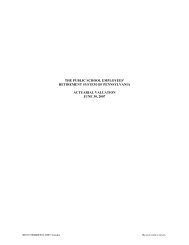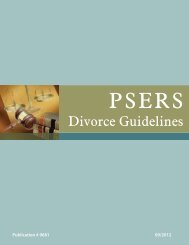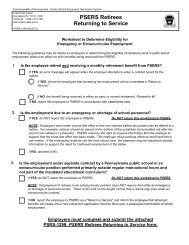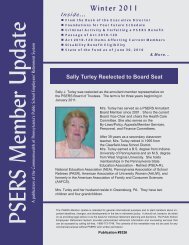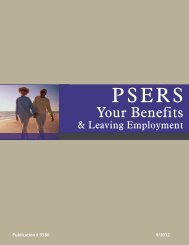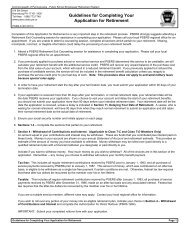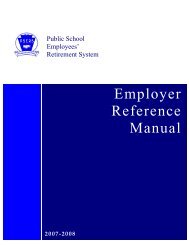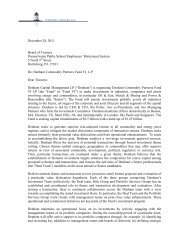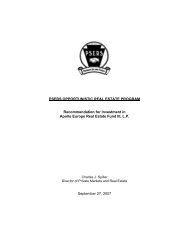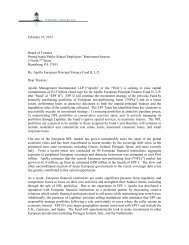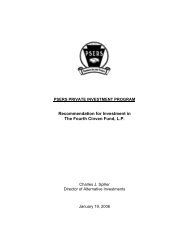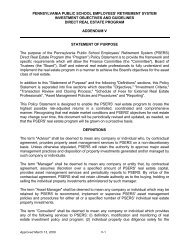Public Information Policy - PSERs
Public Information Policy - PSERs
Public Information Policy - PSERs
You also want an ePaper? Increase the reach of your titles
YUMPU automatically turns print PDFs into web optimized ePapers that Google loves.
<strong>Public</strong> <strong>Information</strong> <strong>Policy</strong><br />
of<br />
the Commonwealth of Pennsylvania<br />
<strong>Public</strong> School Employees’ Retirement Board<br />
As adopted by<br />
the Board of Trustees<br />
on December 13, 1994<br />
Effective<br />
December 13, 1994<br />
Adopted: December 13, 1994<br />
Date Last Revised: December 12, 2008<br />
Date Last Reviewed by Chief Counsel: January 10, 2013
<strong>Public</strong> School Employees’ Retirement Board <strong>Policy</strong> on <strong>Public</strong> <strong>Information</strong><br />
I. GENERAL POLICY.<br />
It has always been, and continues to be, the policy of the <strong>Public</strong> School Employees'<br />
Retirement Board ("Board") to provide access to public records to the fullest extent<br />
required by law and Commonwealth of Pennsylvania policy, consistent with its duties to<br />
protect the interests and rights of the <strong>Public</strong> School Employees’ Retirement System<br />
(“PSERS”) and its members. This extensive revision of this <strong>Policy</strong> is occasioned by the<br />
enactment of the new Right-to-Know Law (“RTKL”), 65 P.S. §§67.101 - 67.3104 on<br />
February 14, 2008, to become effective on January 1, 2009.<br />
In addition to the RTKL, the release of information pertaining to PSERS’ business is<br />
controlled by, Management Directive 205.36 (Amended November 20, 2008), the<br />
"Sunshine Act," 65 Pa. C.S. §§ 701-716 and the <strong>Public</strong> School Employees’ Retirement<br />
Code (“Retirement Code”), 24 Pa. C.S. §§8101-9102. The RTKL governs the inspection<br />
and copying of agency records; Management Directive 205.36 establishes policies and<br />
procedures for agency compliance when responding to requests made pursuant to the<br />
RTKL; the "Sunshine Act" requires public agencies to hold certain meetings and hearings<br />
open to the public; and the Retirement Code contains certain relevant provisions unique to<br />
PSERS.<br />
Other applicable authorities include Administrative Agency Law, 2 Pa. C.S. §§501-<br />
508; Administrative Code (particularly 71 P.S. §182), General Rules of Administrative<br />
Practice and Procedure, 1 Pa.Code Ch. 31-35, Pennsylvania decisional law, Management<br />
Directives (particularly No. 505.18), as well as any other laws, rules, regulations, and<br />
policy directives that may apply to public records. The Office of Chief Counsel should be<br />
consulted in cases in which this <strong>Policy</strong> does not provide sufficient guidance to reach a<br />
determination.<br />
In promulgating this new <strong>Policy</strong> on <strong>Public</strong> <strong>Information</strong>, this Board must recognize<br />
and give effect not only to the statutory and decisional law on the subject but also to its<br />
fiduciary and administrative duties and obligations to the members of PSERS and to the<br />
<strong>Public</strong> School Employees' Retirement Fund (the “Fund”). In balancing situations in which<br />
the right of the public to know competes with those other duties and obligations, PSERS<br />
shall apply the standards listed below, as appropriate.<br />
• If the Board has reasonable grounds to believe that criminal activity has occurred<br />
or may occur, information that could be used in furtherance of the criminal activity shall not<br />
be released.<br />
• In compliance with state and federal laws that protect the privacy of health-care<br />
information, including the Health Insurance Portability and Accountability Act of 1996,<br />
medical records shall not be released to the public.<br />
• <strong>Information</strong> that could, if disclosed, be detrimental to Fund investments under the<br />
standard of care set forth in 24 Pa. C.S. §8521, shall not be released.<br />
2
• Requests for information pertaining to PSERS’ employees shall be administered<br />
in accordance with Management Directive 505.18 Amended, Management Directive<br />
505.12 Amended and 67 P.S. § 708(b)(7).<br />
Consistent with this policy, PSERS may, from time to time, make available on its<br />
web site (www.psers.state.pa.us) certain financial and investment information to facilitate<br />
access to such information and reduce the time associated with responding to formal<br />
written RTKL requests.<br />
This <strong>Policy</strong> shall be construed and applied to give effect to compulsory changes in<br />
the law or Commonwealth policy that may become effective subsequent to the adoption of<br />
this <strong>Policy</strong>.<br />
II. DEFINITIONS.<br />
The RTKL defines a “record” and “public record” respectively as follows (emphasis<br />
added):<br />
A “Record” is:<br />
“<strong>Information</strong>, regardless of physical form or characteristics, that<br />
documents a transaction or activity of an agency and that is created,<br />
received or retained pursuant to law or in connection with a transaction,<br />
business or activity of the agency. The term includes a document, paper,<br />
letter, map, book, tape, photograph, film or sound recording, information<br />
stored or maintained electronically and a data-processed or imageprocessed<br />
document.”<br />
“<strong>Public</strong> Record” is defined as:<br />
A record . . . that:<br />
(1) is not exempt under section 708;<br />
(2) is not exempt from being disclosed under any other Federal or State<br />
law or regulation or judicial order or decree; or<br />
(3) is not protected by a privilege.<br />
The Board recognizes three specific statutory exemptions from disclosure in the<br />
Retirement Code:<br />
1. Records that would conflict with the Board’s duty to protect the<br />
rights of the membership as to privacy and confidentiality under 24<br />
Pa C.S. §8502(i).<br />
2. Records relating to partnerships and other alternative investments<br />
described in 24 Pa. C.S. §8502(e)(2)(i) - (iii).<br />
3. Records that could, if disclosed, be detrimental to Fund<br />
investments under the standard of care imposed on the Board by<br />
24 Pa. C.S. §8521.<br />
3
The definitions of other terms used in this <strong>Policy</strong> are either contained in<br />
Management Directive 205.36, which is attached to this <strong>Policy</strong> as Appendix A, or made<br />
when the term is first used in this <strong>Policy</strong>.<br />
III. PROCEDURE FOR REQUESTS.<br />
A. Adherence to Management Directive 205.36.<br />
PSERS shall follow the procedure set forth in Management Directive 205.36, which<br />
is attached as Appendix A, for responding to RTKL requests and for handling exceptions<br />
to the denial of RTKL requests.<br />
B. Agency Open Records Officer (“AORO”).<br />
All RTKL requests shall be directed to PSERS’ AORO. Telephone inquiries to the<br />
AORO should be made to (717) 720-4749. Requests for public information must be in<br />
writing, signed by the requester, and addressed as follows:<br />
Mail or Other Means of Delivery<br />
Facsimile<br />
Open Records Officer<br />
Open Records Officer<br />
<strong>Public</strong> School Employees’ Retirement System <strong>Public</strong> School Employees’<br />
5 N. Fifth Street Retirement System<br />
Harrisburg, PA 17108-0125 (717) 772-5372<br />
E-mail requests shall be made to: ra-PSERSRTKL@state.pa.us<br />
Submittal of a request to any other address or facsimile number does not give rise<br />
to any obligation on the part of PSERS to respond to it, nor can it serve as a basis for the<br />
deemed denial of the request.<br />
C. Who has the Right to Know?<br />
A “requester” can be any person or corporation who is a legal resident of the United<br />
States, regardless of residency within or outside of the Commonwealth.<br />
D. Form and Content of Request.<br />
Requests for public records must: (1) be in writing, (2) contain the name, address<br />
and telephone number(s) of the requester, (3) be signed by the requester, (4) be clearly<br />
marked as a right-to-know request, (5) reasonably and specifically describe the information<br />
sought, and (6) provide the address to which PSERS should send its response. The<br />
request may be on the form developed by the Office of Open Records (“OOR”). PSERS<br />
does not accept anonymous or verbal requests for records. Requests may be sent via<br />
facsimile, mail and e-mail.<br />
E-mail requests must be addressed to: ra-PSERSRTKL@state.pa.us<br />
4
E. Business Hours.<br />
PSERS’ regular business hours are from 7:30 a.m. to 4:30 p.m. on each business<br />
day. Any request received after business hours of a particular day shall be deemed<br />
received on the next business day.<br />
F. Physical Access to <strong>Public</strong> Records.<br />
In the event that a requester is allowed physical access to public records, PSERS<br />
shall designate a public access room in its headquarters located at 5 N. Fifth St.,<br />
Harrisburg, PA or in any of its field offices for use during regular business hours.<br />
G. Notice to Member.<br />
When PSERS complies with a RTKL request for public information regarding an<br />
individual member’s account, PSERS shall, whenever reasonably practicable, provide<br />
subsequent written notice to the member that identifies (a) the name of the requester and<br />
(b) the information provided by PSERS. Members do not have the right to approve or<br />
disapprove a request for public records. The request for information and a record of its<br />
administration shall also be retained in the member's file.<br />
H. Member Authorization for Release of <strong>Information</strong>.<br />
PSERS may release information that is available to a member from the member’s<br />
file, including information that would otherwise not be released, upon written authorization<br />
by the member directed to PSERS. PSERS will limit its release of information to the<br />
extent provided in the member’s authorization.<br />
I. Fees.<br />
PSERS shall assess fees as prescribed by Management Directive 205.36<br />
Amended. A fee in the amount of 25 cents per page shall be charged for photocopies.<br />
PSERS reserves the right, from time to time, to change the fees it assesses.<br />
PSERS may waive fees on the basis of hardship or other relevant factors, in its sole<br />
discretion. PSERS may, in its discretion, require payment of fees in advance if the fees<br />
are expected to exceed $100.<br />
J. Questions.<br />
Questions regarding this <strong>Policy</strong> may be directed to PSERS’ AORO at the above<br />
address or at (717) 720-4749.<br />
5
IV. AGENCY INFORMATION.<br />
RETIREMENT BOARD BUSINESS<br />
In responding to requests for public records relating to the business of this Board,<br />
PSERS shall consider the fiduciary obligations and standard of care set forth in the<br />
Retirement Code. For example, by application of the "prudence" standard set forth in<br />
PSERS’ enabling legislation, premature disclosure of information that could be detrimental<br />
to PSERS’ interests in an investment would be prohibited if "persons of prudence,<br />
discretion, and intelligence who are familiar with such matters" would not disclose the<br />
information in the conduct of their own affairs. 24 Pa.C.S. §8521(a).<br />
As a general rule, investment matters that have been approved for funding by the<br />
Board are subject to disclosure, unless the approval is conditioned in a manner that calls<br />
for confidentiality until the conditions are satisfied.<br />
The Retirement Code also sets forth a duty for PSERS to "protect the rights of its<br />
membership as to privacy and confidentiality." 24 Pa.C.S. §8502(i). The membership's<br />
privacy "rights" include the prohibition in the RTKL against release of records that would<br />
impair a member's personal security. 65 P.S. §708(b)(1)(ii). The fact that requested<br />
information may be used for commercial purposes, standing alone, is not a permissible<br />
ground for denial.<br />
Requests for information pertaining to PSERS’ employees shall be administered in<br />
accordance with Management Directive 505.18 Amended.<br />
6
The following is a non-exclusive list that illustrates common examples of public and<br />
non-public information:<br />
<strong>Public</strong> <strong>Information</strong><br />
•Board agenda<br />
•Approved Board minutes<br />
•Financial reports<br />
•Reports of purchases and sales of<br />
securities<br />
•Proxies voted<br />
•Board reports on annuities<br />
•Board resolutions<br />
•Signing resolutions<br />
•Board policies and bylaws<br />
Non-<strong>Public</strong> <strong>Information</strong><br />
•Proposed or pending investments if<br />
premature release of information could be<br />
detrimental to PSERS’ interests<br />
•Documents protected by attorney-client<br />
privilege<br />
•Proposed Retirement Board opinions not<br />
yet acted upon<br />
•Reports, summaries and other<br />
documents presented to the Board in<br />
advance of, or at, public meetings that do<br />
not qualify as public records under the<br />
RTKL and that may, but are not required<br />
to be, marked, held and treated as<br />
confidential<br />
•Reports, summaries and other<br />
documents presented to the Board in<br />
advance of, or at, public meetings that do<br />
qualify as public records under the RTKL<br />
7
OFFICE OF CHIEF COUNSEL<br />
Staff notations and memoranda that include Office of Chief Counsel documents,<br />
may be privileged or otherwise protected and should be reviewed by the Office of Chief<br />
Counsel prior to release.<br />
The following is a non-exclusive list that illustrates common examples of public and<br />
non-public information:<br />
<strong>Public</strong> <strong>Information</strong><br />
•Court orders, including domestic relations<br />
orders<br />
•Hearing examiners’ reports<br />
•Administrative hearing records<br />
•Briefs and pleadings filed of record<br />
Non-<strong>Public</strong> <strong>Information</strong><br />
•Legal opinions that are labeled confidential,<br />
protected by attorney-client privilege, or<br />
attorney work product, unless disclosure is<br />
approved by the Office of Chief Counsel<br />
•Research/internal memoranda<br />
•Medical records<br />
•Letters to clients that are labeled<br />
confidential, protected by attorney-client<br />
privilege, or attorney work product, unless<br />
disclosure is approved by the Office of Chief<br />
Counsel<br />
•Records pertaining to investigations within<br />
the meaning of "public record" as defined in<br />
the RTKL<br />
•Records relating to investment transactions<br />
that are protected by attorney-client privilege<br />
or that otherwise do not qualify as public<br />
records under the RTKL<br />
•Records relating to litigation matters<br />
protected by attorney-client privilege or<br />
otherwise under this <strong>Policy</strong><br />
•Records exempted from disclosure under 65<br />
P.S. §67.708(b).<br />
•Records protected by the attorney-work<br />
product privilege, the attorney-client privilege<br />
or any other privilege recognized by<br />
Pennsylvania Courts.<br />
INVESTMENT OFFICE<br />
The information specified in the Retirement Code at 24 Pa. C.S. §8502(e)(5)(i)-(viii)<br />
is public information. The information specified in 24 Pa. C.S. §8502(e)(2)(i)-(iii) is nonpublic<br />
information. The following is a non-exclusive list that illustrates common examples<br />
of public and non-public information:<br />
8
<strong>Public</strong> <strong>Information</strong><br />
•Listing of investment managers<br />
•Summary of assets by investment<br />
managers<br />
•Brokerage commissions paid<br />
•Statement of investment<br />
policy/amendments<br />
•Investment portfolio - list of assets<br />
•Investment manager performance/status<br />
reports<br />
•Partnerships and Other Alternative<br />
Investments:<br />
(i) The name, address and vintage<br />
year of each alternative investment<br />
vehicle;<br />
(ii) The identity of the manager of<br />
each alternative investment vehicle;<br />
(iii) The dollar amount of the<br />
commitment made by PSERS to each<br />
alternative investment vehicle;<br />
(iv) The dollar amount of cash<br />
contributions made by PSERS to<br />
each alternative investment vehicle<br />
since inception;<br />
Non-<strong>Public</strong> <strong>Information</strong><br />
•Special staff reports and consultant<br />
reports that warrant protection under the<br />
general rule above<br />
•Investment negotiations<br />
•Documents protected by attorney-client<br />
privilege or attorney-work product<br />
privilege<br />
•Partnerships and Other Alternative<br />
Investments:<br />
(i) Identities of specific alternative<br />
investment portfolio investments<br />
(ii) Performance data on, and<br />
valuations of, specific alternative<br />
investment portfolio investments<br />
(iii) Partnership agreements, letter<br />
agreements, subscription agreements<br />
and other alternative investment<br />
contracts if, and to the extent that, the<br />
release of such information would be<br />
reasonably likely to have a detrimental<br />
effect on PSERS’ interest in an<br />
investment<br />
(iv) <strong>Information</strong> that PSERS agreed to<br />
keep confidential under written<br />
agreements, unless disclosure is<br />
required by law<br />
(v) The dollar amount of cash<br />
distributions received by PSERS from<br />
each alternative investment vehicle<br />
since inception;<br />
(vi) The net internal rate of return of<br />
each alternative investment vehicle<br />
since inception, provided that PSERS<br />
shall not be required to disclose the<br />
net internal rate of return under<br />
circumstances in which, because of<br />
the limited number of portfolio assets<br />
remaining in an alternative investment<br />
vehicle, such disclosure could reveal<br />
the values of specifically identifiable<br />
10
emaining portfolio assets to the<br />
detriment of the alternative<br />
investment;<br />
(vii) The aggregate value of the<br />
remaining portfolio assets attributable<br />
to PSERS’ investment in each<br />
alternative investment vehicle,<br />
provided that PSERS shall not be<br />
required to disclose said value under<br />
circumstances in which, because of<br />
the limited number of portfolio assets<br />
remaining in an alternative investment<br />
vehicle, such disclosure could reveal<br />
the values of specifically identifiable<br />
remaining portfolio assets to the<br />
detriment of the alternative<br />
investment;<br />
(viii) The dollar amount of total<br />
management fees and costs paid to<br />
each alternative investment vehicle by<br />
PSERS on an annual fiscal year-end<br />
basis; and<br />
(ix) Partnership agreements, letter<br />
agreements, subscription agreements<br />
and other alternative investment<br />
contracts, provided that the release of<br />
such information would not be<br />
reasonably likely to have a detrimental<br />
effect on PSERS’ interest in an<br />
investment (such contracts may be<br />
redacted to the extent necessary).<br />
• Investment advisory agreements,<br />
consultant agreements, brokerage<br />
agreements, and other investment<br />
services agreements<br />
•Asset allocation plans and investment<br />
guidelines and objectives<br />
11
AGENCY ADMINISTRATION<br />
Consultant recommendations, staff recommendations, and special studies or<br />
investigations tend to be non-public information.<br />
In reference to the competitive bidding process, the RTKL, 65 P.S. §708(b)(26) has<br />
changed the law, and now provides that bids and proposals are not public records unless<br />
or until a contract is executed with one of the bidders or offerors, at which time all<br />
proposals – successful or unsuccessful – are subject to disclosure, with the exception of<br />
financial information furnished to demonstrate economic capability.<br />
PSERS may furnish information to or receive information from other<br />
Commonwealth agencies under 71 P.S. §182, which provides that whenever “power is<br />
vested in a department, board, or commission, to inspect, examine, secure data or<br />
information, or to procure assistance, from any other department, board, or commission,<br />
a duty is hereby imposed upon the department, board, or commission, upon which<br />
demand is made, to render such power effective.” PSERS may condition the release of<br />
information under §182 on the completion of a confidentiality agreement by the requesting<br />
entity.<br />
The following is a non-exclusive list that illustrates common examples of public and<br />
non-public information:<br />
<strong>Public</strong> <strong>Information</strong><br />
•Legislative updates<br />
•Board-approved budget requests<br />
•Requests for Proposals and Invitations<br />
to Bid<br />
•The names of the bidders and the<br />
amounts bid in the case of responses to<br />
Invitations to Bid<br />
• Responses to Requests for Proposal<br />
after a contract has been entered<br />
•All executed contracts for goods and<br />
services<br />
•Board-approved actuarial<br />
valuations/evaluations<br />
Non-<strong>Public</strong> <strong>Information</strong><br />
•Competitive proposals prior to the<br />
execution of a contract, and financial<br />
information contained in a proposal used<br />
to demonstrate economic capability.<br />
•Summary report on proposals<br />
•Independent auditor's report to<br />
management<br />
•Special staff reports that warrant<br />
protection under this policy<br />
•Materials protected by attorney-client<br />
privilege<br />
• Identity of evaluation committee and<br />
notes, recommendations and point<br />
scores of committee members<br />
•Board-approved actuarial notes/tables<br />
•Audited financial statements<br />
12
BENEFITS ADMINISTRATION<br />
The Retirement Code requires the Board to “protect the rights of its membership as<br />
to privacy and confidentiality.” 24 Pa. C.S. §8502(i); see Rowland v. <strong>Public</strong> School<br />
Employees’ Retirement System, 885 A. 2d 621 (Pa. Cmwlth. 2005). The RTKL expressly<br />
prohibits release of information that may not be disclosed under any other Federal or State<br />
Law. 65 P.S. §67.102 (“<strong>Public</strong> Record”). A member has a privacy interest guaranteed by<br />
the Pennsylvania Constitution in avoiding disclosure of personal matters. See Denoncourt<br />
v. State Ethics Commission, 504 Pa. 191, 198, 470 A.2d 945, 948 (1983). Therefore, in<br />
responding to requests for records that contain members’ personal information, for those<br />
matters not specifically addressed below, PSERS will follow the balancing test adopted in<br />
Times-Publishing Co. v. Michel, 633 A.2d 1233 (Pa. Cmwlth. 1993), appeal denied, 538<br />
Pa. 613, 645 A.2d 1321 (1994), and will release the records only if the benefits of<br />
releasing the information outweigh the individual’s privacy interest. The Board’s policy not<br />
to release addresses or dates of birth relied upon Sapp Roofing Co. v Sheet Metal<br />
Workers’ International Assoc., 713 A.2d 627 (Pa. 1988), and was upheld by the<br />
Commonwealth Court in Rowland v. <strong>Public</strong> School Employees’ Retirement System, 885 A.<br />
2d 621(Pa. Cmwlth. 2005). In Sapp, id. at 630, the Supreme Court stated: “Pennsylvania<br />
recognizes the right to privacy in Article I, § 8 of the Pennsylvania Constitution, and this<br />
Court often invokes this right to privacy to give greater protection to our citizens than that<br />
found in the United States Constitution.” The staff is authorized to release any pertinent<br />
information from active and retired members' files to an employer as required in<br />
connection with PSERS’ retirement transactions, with the exception of beneficiary<br />
nomination information in cases where no payment is due. Specific benefit calculations<br />
are not provided to the public; however, PSERS will provide actuarial tables, retirement<br />
formulas and the necessary data for preparing calculations upon request.<br />
In addition, PSERS will respond to a valid subpoena requesting the production of<br />
documents or testimony concerning a member’s account at a trial, hearing or deposition,<br />
as provided in law or rule of court. Further, PSERS can be compelled to produce<br />
documents and things for inspection by parties in a lawsuit even if no trial, hearing or<br />
deposition takes place, as provided in Rule 4009.21 of the Pennsylvania Rules of Civil<br />
Procedure.<br />
The following is a non-exclusive list that illustrates common examples of public and<br />
non-public information:<br />
13
<strong>Public</strong> <strong>Information</strong> - Active Member<br />
•Member contributions and interest<br />
•Retirement credited service with PSERS<br />
•Last full fiscal year retirement-covered<br />
salary reported<br />
•Last employer(s) reported<br />
Non-<strong>Public</strong> <strong>Information</strong> – Active Member<br />
•Social Security number<br />
•Address/telephone number<br />
•Beneficiary designation<br />
•Date of birth<br />
•Present value of account<br />
•Retirement estimates<br />
•Medical reports and other information<br />
protected under the Health Insurance<br />
Portability and Accountability Act of 1996<br />
<strong>Public</strong> <strong>Information</strong>-Other than Active<br />
Member<br />
•Current monthly annuity<br />
•Beneficiary/designated survivor<br />
subsequent to member's death<br />
•Option selected<br />
•Date of retirement<br />
•Years of credited service<br />
•Member contributions and interest<br />
Non-<strong>Public</strong> <strong>Information</strong>-Other than Active<br />
Member<br />
•Social Security number<br />
•Address/telephone number<br />
•Beneficiary/survivor designation prior to<br />
member's death<br />
•Specific annuity calculation<br />
•Medical reports and other information<br />
protected under the Health Insurance<br />
Portability and Accountability Act of 1996<br />
•Date of birth<br />
V. PRESS RELEASES/PRESS CONFERENCES.<br />
All press inquiries shall be referred to the Press Secretary, who may coordinate a<br />
response with the Executive Office, the Investment Office, or the Office of Chief Counsel.<br />
<strong>Information</strong> that is not subject to disclosure under this <strong>Policy</strong> or that is otherwise<br />
afforded protection under the law shall not be released to the press.<br />
If the Press Secretary determines that the subject of the inquiry relates to a<br />
significant or controversial issue that PSERS has not yet addressed, the Executive<br />
Director and Board Chair will be consulted immediately for a decision or concurrence to<br />
determine the manner in which to handle the issue.<br />
14
The Press Secretary may issue press releases as appropriate and provide copies<br />
to the Board. PSERS’ staff will not conduct press conferences without prior notification to<br />
the Board.<br />
15
Sections Amended January 1, 2000<br />
The spelling of “employe” has been changed in all sections to “employee.”<br />
Sections Amended January 31, 2003<br />
All sections amended to conform with Act 2002-100, enacted June 29, 2002;effective<br />
December 26, 2002 (Management Directive 205.36, dated November 27, 2002).<br />
Sections Amended June 18, 2004<br />
Sections throughout <strong>Policy</strong> revised to provide staff guidance in handling matters involving<br />
public information issues frequently encountered in the administration of benefits and<br />
investments, and to conform to Management Directive 205.36 Amended, dated November<br />
5, 2003.<br />
Sections Amended March 18, 2005<br />
Housekeeping changes to the <strong>Policy</strong> included: Citation to the Administrative Agency<br />
Law corrected in the discussion of “who has the right to know;” reflecting a change in<br />
the RTKL from the word “citizen” to “resident;” and clarification of the balancing test as it<br />
affects the disclosure of personal information of members and annuitants where the<br />
Board has already announced a policy.<br />
Sections Amended December 9, 2005<br />
Revised the listing of items under the "<strong>Public</strong> <strong>Information</strong>" column in the Investment<br />
Office section.<br />
Reference added to the Rowland v. <strong>Public</strong> School Employees Retirement System case.<br />
Sections throughout <strong>Policy</strong> revised for clarification or editorial purposes.<br />
Sections Amended January 26, 2007<br />
Added references to the Administrative Code in Section I and in Section IV under the<br />
Agency Administration heading.<br />
Revised Section III.C. to expand the definition of "requester" in light of a recent federal<br />
case, Lee v. Minner.<br />
Revised Section IV under the Investment Office heading to reflect an amendment to the<br />
<strong>Public</strong> School Employees' Retirement Code dealing with investment information, 24 Pa.<br />
C.S. §8502(e).<br />
Included references to the Health Insurance Portability and Accountability Act of 1996 in<br />
Section IV under the Benefits Administration heading.<br />
16
Sections Amended December 12, 2008<br />
Updated the <strong>Policy</strong> to comply with the new Right-to-Know Law of February 14, 2007, 65<br />
P.S. §67-101, et seq., effective January 1, 2009.<br />
17



